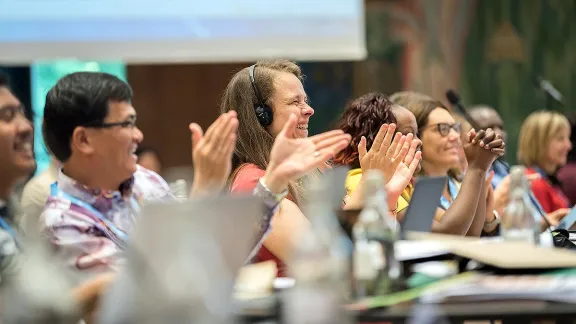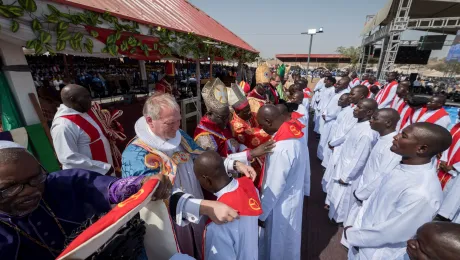
The LWF Council approves seven messages, resolutions and public statements on pressing issues. Photo: LWF/Albin Hillert
LWF Council calls for action on number of urgent issues
(LWI) - The governing body of the Lutheran World Federation has highlighted a number of issues that need the urgent attention of churches and the international community. On the final day of the 2018 Council meeting, it adopted resolutions, public statements and messages on violence in Nigeria, reform of the UN Security Council, support for the global compacts on refugees and migration, the separation of children from their families at the US-Mexico border, the Israel-Palestine situation, rising populism, and greater inclusion of young people in the life of the church.
Resolution on the situation in north-east and central Nigeria
The council extends its prayers for and solidarity with the people and churches of Nigeria, particularly the LWF member churches: the Lutheran Church of Christ in Nigeria and the Lutheran Church in Nigeria. In recent weeks north-east and central Nigeria have witnessed a devastating escalation in protracted communal violence.
“The council condemns in the strongest possible terms the violent escalation in the regions and the deplorable killings, including women and children in their homes and places of worship.
“It calls upon the Government of Nigeria to initiate a comprehensive peace process led by religious leaders and traditional elders to amicably address the underlying causes of the conflict, serve justice and accountability for the lives lost, and the destruction of property, so as to foster reconciliation and mutual peaceful coexistence in the region and the country at large going forward. It calls upon member churches to pray for peace in these regions, consider solidarity visits and advocate with their governments to raise these concerns with the Nigerian authorities.”
Resolution on Security Council reform
The council deeply regrets that the United Nations Security Council has been unable to adequately respond to the crisis in Syria, the Israel–Palestine conflict, the situation in South Sudan, and others. It further recognizes that its lack of response to some of the most flagrant and bloody conflicts today is due to the veto power held by five member states, which often continue to set their particular geopolitical interests above the common interest and their charter obligation of maintaining international peace and security.
The LWF Council “calls upon the Member Churches and Communion Office to advocate for Security Council reform proposals that stipulate that the veto should not be used in cases of mass atrocities such as crimes against humanity, crimes of genocide and war crimes.”
Resolution supporting the roll-out of global compacts on refugees and migration
The world is witnessing the largest number of people on the move since World War 2, many of whom have been forced to flee their homes. In response to this global challenge, the United Nations is poised to adopt two important documents on how the international community should respond to migration and mass displacement.
“The Council calls upon LWF member churches to continue to support the work of the LWF World Service as they assist refugees and host communities, particularly in the areas of conflict prevention, reconciliation, and peacebuilding... and to promote and advocate for the implementation of both compacts in their respective countries.
The council calls upon the LWF communion office to support member churches as they advocate for the implementation of the compacts.”
Public statement on the separation of children from their families at the US-Mexico border
The LWF Council expresses its “deep distress” about the situation on the US-Mexico border that has resulted in migrant children being separated from their families.
“The LWF Council calls upon the US Administration to review its policies towards asylum seekers, stop detaining families and utilize community-based alternatives to detention as piloted by the US-based Lutheran Immigration and Refugee Service… It expresses its hope that negotiations underway on a Global Compact on Safe, Orderly and Regular Migration will lead to better conditions, international cooperation and security for migrants and their families.
“As Lutherans and as citizens, we can work with elected officials toward humane, just and compassionate solutions.”
Public statement on Israel-Palestine
The council calls on LWF member churches to renew their awareness of the situation in Israel and Palestine where the occupation continues today. It reaffirms the LWF’s support for a two-state solution to the conflict between Israel and Palestine, even though there are no negotiations between the parties.
“The LWF continues to recognize Jerusalem as a capital city shared between the two peoples and three religions and opposes all actions which seek to change the status quo absent a final status agreement. The Council calls upon the Member Churches to inform their members about the public statement by the LWF Council on the situation in the Middle East in 2011 as a basis for building awareness, engaging in advocacy and accompanying the Evangelical Lutheran Church in Jordan and the Holy Land.”
Message to the member churches on being churches of hope - resisting forces of exclusionary populism
LWF member churches in various societies struggle with the effects of rising populism. The council is deeply concerned about these developments. “When we see people bound by fear, we lift up the message of Christ. It is a message of hope that drives out fear; a message of compassion that challenges indifference; a message of justice that resists oppression; a message of reconciliation that holds fast to peace-building. This good news is desperately needed today.
“The LWF Council encourages its member churches, including their related theological institutions [to have] dialogue and exchange within and between churches. To overcome the forces of ethno-nationalist populism, we call for churches to discern, engage and resist, based on the faith, love and hope to which Christ has called us.”
Message to the LWF member churches on encouraging meaningful participation of youth in the life and work of member churches
The council is encouraged by the progress in youth participation in LWF governance meetings. However, meaningful youth participation remains a challenge in some member churches.
“The council strongly affirms the Youth Message that was adopted at the 12th Assembly in Windhoek, Namibia, and urges church leaders to focus on creating space for intentional inclusion of youth. They bring particular skills, knowledge and experience to the life of the church.”
The 2018 LWF Council meeting takes place in Geneva from 27 June - 2 July. The theme of the Council is “Freely you have received, freely give” (Matthew 10:8, NIV). The LWF Council meets yearly and is the highest authority of the LWF between assemblies. It consists of the President, the Chairperson of the Finance Committee, and 48 members from LWF member churches in seven regions.


